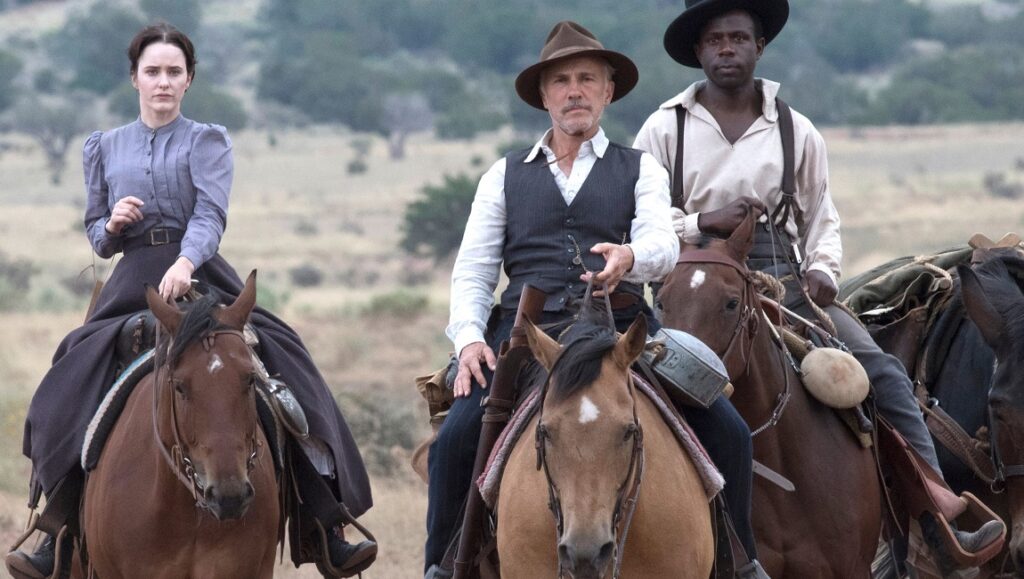Dead for a Dollar is another failed Western outing from Walter Hill, a well-intentioned but visually shoddy film that sags whenever its action disappears.
After his previous excursion into the genre, 1995’s Wild Bill, drew a mixed response, legendary filmmaker Walter Hill once again takes aim at the Western with Dead for a Dollar, a throwback oater that seeks to celebrate the genre’s history, while also being critical of its issues, particularly concerning the portrayal of people of color and women. In fact, the plot seems to be a conscious subversion of John Ford’s 1956 classic The Searchers, its kidnap-and-rescue story turned on its head by a narrative twist early on. However, in spite of his good intentions, the director behind The Warriors and the über-stylish The Driver — both classics in their own right — ends up falling short of his own ambitions.
The film opens with a meeting between Christoph Waltz’s bounty hunter Max Borlund and Willem Dafoe’s charmingly sociopathic Joe Cribbens. Cribbens is about to be released from jail, after being put there by Borlund, and in spite of his insistence, the possibility of the outlaw taking revenge doesn’t seem to be entirely off the table. Later, Borlund accepts a job tracking down Rachel Price (Rachel Brosnahan), the wife of businessman Nathan Price (Hamish Linklater), who was reportedly kidnapped by a Black Army deserter named Elijah Jones (Brandon Scott). Aided by Sergeant Poe (Warren Burke), a former comrade of Elijah’s, Borlund quickly tracks the pair down but learns that Rachel wasn’t kidnapped as much as she willingly fled her abusive husband. The stoic gunslinger is forced to make a choice: finish the job by handing the runaways over to his employer, or follow his conscience and help them make their escape. Things become even more complicated when the newly-released and bad-mannered Cribbens somehow gets himself caught up in the situation as well.
Dead for a Dollar‘s familiar tale of two morally grey men on either side of the law is enhanced by the inclusion of different, previously neglected POVs. The two black characters, Poe and Elijah, both lament their place in post-Civil War America, but disagree on how to best navigate it. Similarly, the progressive Rachel Price is constantly belittled and spoken over by the men around her, and she sees her escape, and romantic entanglement, with Elijah as an avenue to find the freedom she’s been denied all her life. It’s admirable enough, and at times even quite intriguing. The film’s liberal use of Western tropes, like tense card games in dusty saloons, a hot-lead final showdown, and an overall fatalistic outlook on life during the dying days of the Old West, feels a lot fresher with these perspectives placed so prominently in the narrative. And aided by a strong showing from the cast, the drama unfolds quite nicely at first. But sadly, this is essentially where all warranted praise ends.
To just get the most glaring flaw out of the way, the film looks like shit. Aside from a few beautiful wide shots of characters riding through the prairie on horseback, the dull, Lifetime movie-esque lighting, hideous sepia color palette, and shallow-focus cinematography rob the world of much-needed texture and make any immersion into it difficult. Not helping matters is the often awkward editing, as well as the constant sidelining of characters set up as central to the story — both likely the result of the production having to work around its stars’ tight schedules. Given the obvious budget constraints, it makes sense that Dead for a Dollar would be dedicated to Budd Boetticher, whose own low-budget Westerns seemed to have inspired the rickety construction of Hill’s latest. Even its title, which it happens to share with an extremely obscure Spaghetti Western from 1968, brings to mind a certain B-movie quality that doesn’t feel entirely inappropriate.
The dialogue-heavy flick does jolt awake occasionally, especially during its brief action scenes — the final shootout provides some gritty thrills, and a fight between Poe and a racist adversary is given a lot of symbolic bite by the fact that it’s carried out with bullwhips — but those moments are few and far between. The result is that Dead for a Dollar mostly sags whenever the action comes to a halt, and, unfortunately, even its well-meaning gestures at inclusivity are undermined by the film’s shoddiness and constant neglect of its characters. Hill’s latest effort will probably provide decent, one-time entertainment for people unsure of what to do with their Sunday afternoon, but considering the director’s legacy and his clear aims with the project, that can’t help but feel like a disappointment.


Comments are closed.